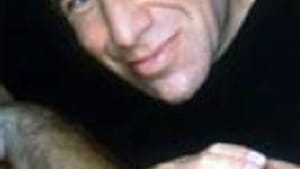Stay in the Loop
BSR publishes on a weekly schedule, with an email newsletter every Wednesday and Thursday morning. There’s no paywall, and subscribing is always free.
'Pippin' at the Forrest (2nd review)

Not a kiddie show
STEPHEN COHEN
Many small children were in the audience for the Philadelphia opening of Pippin. Maybe their parents presumed this show was similar to the same composer’s Wizard-of-Oz fable, Wicked. But Pippin deals with war, rape, fratricide and burning people alive. This is not a kiddie show.
The ferociously anti-war story condemns leaders who invoke God as they send young men off to die. It’s as timely today as it was during the Vietnam-war era when it was written. Stephen Schwartz (music and lyrics), Roger O. Hirson (book) and the original director-choreographer Bob Fosse softened their attack by surrounding the characters with magic tricks (the opening number, "Magic To Do," is emblematic), and many of the players wear outrageous wigs and painted faces. I’d like to see a more realistic production that breaks this tradition, but this director, Gabriel Barre, emphasizes the circus and the surreal.
André Ward is strong as the Leading Player (Ben Vereen’s role in 1972). He is the ringmaster who smiles as he encourages Pippin to set fire to himself. Mickey Dolenz, of Monkees fame, performs a serious acting job as Pippin’s father, the emperor Charlemagne. Many others in the cast over-act and proclaim their lines instead of singing them. Joshua Park is too agitated in the title role, which works best when sung sweetly and acted with naiveté. This character is similar to Candide in the Bernstein musical; he is an innocent on a journey in search of life’s purpose. Barbara Marineau as his elderly grandma also is too manic and misses a chance to win over the audience with her catchy "Just No Time At All." That song is a gem, and its homespun philosophy presages the implied larger point of the second act: End foreign military adventures, stay home and find pleasure in domestic life.
Shannon Lewis is good-looking as Pippin’s sexy stepmother Fastrada, but she doesn’t sing on pitch. The best supporting player is Teal Wicks as the widow with a young son who nurtures Pippin in the second act. Her singing and acting are bewitching. Mark Dendy’s choreography is competently based on the Fosse original but neither as bold nor as sinister.
Schwartz and Hirson have tinkered with the ending of this play for three decades and have written different denouements. The original script ends with Catherine asking Pippin: "How do you feel?" and he replies: "Trapped, but happy, which isn't bad for the end of a musical comedy. Ta da!" That’s too abrupt. The new ending calls for Pippin and Catherine to remove their makeup and head offstage towards domestic tranquility— and then her son, representing a new generation, falls for the enticements of "glory" and, presumably, warfare.
To read another review of Pippin, click here.
STEPHEN COHEN
Many small children were in the audience for the Philadelphia opening of Pippin. Maybe their parents presumed this show was similar to the same composer’s Wizard-of-Oz fable, Wicked. But Pippin deals with war, rape, fratricide and burning people alive. This is not a kiddie show.
The ferociously anti-war story condemns leaders who invoke God as they send young men off to die. It’s as timely today as it was during the Vietnam-war era when it was written. Stephen Schwartz (music and lyrics), Roger O. Hirson (book) and the original director-choreographer Bob Fosse softened their attack by surrounding the characters with magic tricks (the opening number, "Magic To Do," is emblematic), and many of the players wear outrageous wigs and painted faces. I’d like to see a more realistic production that breaks this tradition, but this director, Gabriel Barre, emphasizes the circus and the surreal.
André Ward is strong as the Leading Player (Ben Vereen’s role in 1972). He is the ringmaster who smiles as he encourages Pippin to set fire to himself. Mickey Dolenz, of Monkees fame, performs a serious acting job as Pippin’s father, the emperor Charlemagne. Many others in the cast over-act and proclaim their lines instead of singing them. Joshua Park is too agitated in the title role, which works best when sung sweetly and acted with naiveté. This character is similar to Candide in the Bernstein musical; he is an innocent on a journey in search of life’s purpose. Barbara Marineau as his elderly grandma also is too manic and misses a chance to win over the audience with her catchy "Just No Time At All." That song is a gem, and its homespun philosophy presages the implied larger point of the second act: End foreign military adventures, stay home and find pleasure in domestic life.
Shannon Lewis is good-looking as Pippin’s sexy stepmother Fastrada, but she doesn’t sing on pitch. The best supporting player is Teal Wicks as the widow with a young son who nurtures Pippin in the second act. Her singing and acting are bewitching. Mark Dendy’s choreography is competently based on the Fosse original but neither as bold nor as sinister.
Schwartz and Hirson have tinkered with the ending of this play for three decades and have written different denouements. The original script ends with Catherine asking Pippin: "How do you feel?" and he replies: "Trapped, but happy, which isn't bad for the end of a musical comedy. Ta da!" That’s too abrupt. The new ending calls for Pippin and Catherine to remove their makeup and head offstage towards domestic tranquility— and then her son, representing a new generation, falls for the enticements of "glory" and, presumably, warfare.
To read another review of Pippin, click here.
Sign up for our newsletter
All of the week's new articles, all in one place. Sign up for the free weekly BSR newsletters, and don't miss a conversation.
 Steve Cohen
Steve Cohen